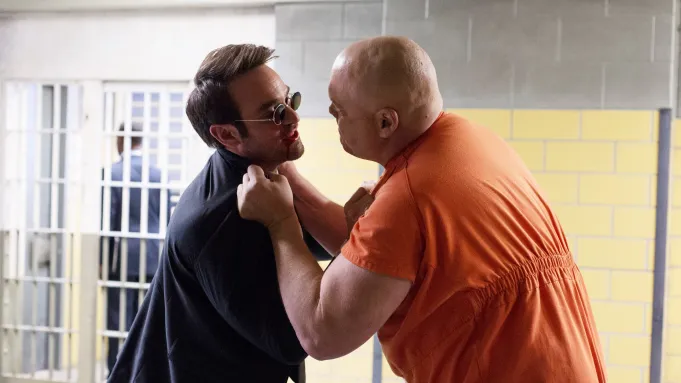If you click on a link and make a purchase we may receive a small commission. Read our editorial policy.
Marvel TV writer J. Holtham chats writing rates and what the WGA is fighting for
Jessica Jones and Supergirl writer J. Holtham talks about his experiences as a screenwriter

This interview has been condensed for clarity.
Popverse: How did you end up in screenwriting? You were a playwright first, right?

J. Holtham: After college I moved into Manhattan, went to grad school there, then worked in theater for 15 years-ish, mainly at Ensemble Studio theater but also at New York Stage and Film, New Dramatist. I wrote so many stupid plays. So many. None got produced, but there were lots and lots of readings.
In the course of- let’s say- the 12 years from the end of my grad school to when I left New York, I think I made a grand total of ten grand over all of that time [for writing]. It’s a tough field. I learned a lot, it’s all proven to be very useful in all of the ways, but also it was a lot.
When you came to LA, was it to do screenwriting?
I came out here to pursue TV and film. But as I tell students, I made a series of terrible choices that worked out, and it’s really luck and the grace of God that any of them did. When I moved to LA in 2012, I had never been to Los Angeles—never visited, didn’t do any scouting, didn’t do any preparatory trips. I didn’t have any film scripts, I didn’t have any TV scripts. I basically had never taken an actual screenwriting course. I didn’t have a job, an agent or a manager, and I didn’t have anywhere permanent to live.
Wow. That’s bold.

Yeahhh. Yeahhhh. Yeahhh. Looking back on it, I wish I could say I was like, 'I’m making a bold move!' But I was just like, 'Eh, this is what I’m going to do.' Because sadly the way that I make major life decisions is always, 'Eh, this seems like fun.'
And in some ways I got here and I got to live that “Year of Yes” life. Anything anyone offered, I was like 'Sure,' because I had no reason not to. And it was in some ways really nice to be free of a lot of things; all of my family was back East, and a lot of my friends, people I know and love. So there was that sense that I get to sort of reinvent or rediscover myself in this new, different place where I’m not defined by those things.
But also there were some really rough rough rough times. My first year I was here, I pretty much didn’t have a job at any point. I had meager savings, and I lived off of the kindness of a friend. I was technically subletting from him, but 4 months into it I was like, Yeah, I don’t have any more money. And he was like 'Well, just stay and get me whatever you can when you can.' That was incredibly kind of him.
There were days I was eating one bowl of pasta with like chili sauce and parmesan, and that was my meal for the whole day. It was a lot.
Wow.
Like I said, it all worked out in that way that things work out in none of the ways you expect them too. But I cannot overstress the amount to which I kind of wandered through life like a babe in the woods, and luckily fell into clover rather than shit.
I think the first thing I saw that you had written was an episode of Supergirl. Was that your first credit?
No. My first TV credit—well, I didn’t really get a credit for it because I was a staff writer, and I didn’t get an episode, I was on Pitch, a show on FOX in 2016. That was my first staff writing gig. And then after that I was on Cloak and Dagger starting the following year, I did two seasons of Cloak and Dagger, in between I did one season of Jessica jones, and then I was on Supergirl.

What was it like working for Marvel?
Getting in with Marvel was really great. Old Marvel TV and also Marvel in general is a strange shop to work for, because it's so secretive. But once they know that they can trust you, they trust you a lot.
What's it like being on set on a show you've written?
I fucking love it. It’s so stressful but it’s also so great. Crews are great, watching it actually come together is great. It’s the best. And for me, I honestly don’t feel like I knew how to write television until I was on set.
How do you mean?
Once you’re on set, you see what works, you see what you need and what you don’t in a script. You also start to understand the dynamics and budgets of a set. You start understanding what costs money, what takes time, the things the producers look for, all of those things that are really really important as you move up in writing.
You also learn how to solve problems quickly. The things you have to make decisions about, and the way you have to make decisions, it’s absolutely invaluable. The fact that we’ve gone basically ten years without sending lower level writers to set is fucking up the business in immeasurable ways.
Why aren't writers going to set?
Usually the scripts are all done either before or at the very early part of production, [at which point] the writers' room disbands. The producer, the studios and networks don’t want to pay to keep writers on to go to set.
Now people are rising to the level of Executive Producer, Co-EP, pitching their own shows or getting tapped to showrun and don’t have any set or post-production experience or knowledge. It’s a fucking train wreck. Because in a fundamental way they don’t know how to make television.
That’s a big part of the WGA negotiations. Since 2017 it has definitely ramped up, but it was always bad.

As I understand it, another part of the strike is about the way studios compensate the upper level writers that they ask to run shows. Is that correct?
Yes. For an upper level writer, the quote is $25000 per script. Say you’re doing ten episodes, and you’re getting $25000 per episode: You’re getting $250000.
But since that’s not tied to a weekly paycheck [as is the case for younger writers], their pay week to week reduces and reduces and reduces.
So when I was a staff writer on Cloak and Dagger, I was on a strict 20-week contract. [Note: "Staff writer" is the lowest paid writer in a writers' room. Generally with each new season of work a young writer is promoted to another level of pay and a new title until one reaches "Executive Producer."] I got to the end of my 20 weeks, I left at the level of staff writer. I was making 4 grand a week.
I went to Jessica Jones, and became a story editor there, my weekly doubled to 8 grand a week. I worked 20 weeks on that and then immediately went back to Cloak & Dagger for season 2, where I was executive story editor and did my twenty weeks.
In that time the Executive Producers I worked for on Jessica Jones were only on Jessica Jones for all of that time. I made more money as a story editor than they made as EPs in that time.
Whoa.
Yeahhh. And since then the studios have just abused the situation even more. Now, instead of a writers’ room for 20 weeks, you’ll get a mini room for 6 or 8 weeks, then the writers leave, and if you’re the showrunner you might just be writing all the episodes yourself, covering set yourself, covering production yourself, and everything gets amoritized down.
It’s a real fuck you.
I see studios talking about how they have lots of content ready to go. But how long can they go on that like that?
Two of the big producers, Apple and Amazon, they don’t care. Their TV business is not their core business, it’s an add-on, it’s a loss leader, so it doesn’t matter to them if there’s new content or not.
But Warner Brothers can’t survive without it. Netflix even can’t survive without new content. There’s a lot of pressure all over the place.
Follow Popverse for upcoming event coverage and news
Find out how we conduct our review by reading our review policy
Let Popverse be your tour guide through the wilderness of pop culture
Sign in and let us help you find your new favorite thing.
















Comments
Want to join the discussion? Please activate your account first.
Visit Reedpop ID if you need to resend the confirmation email.